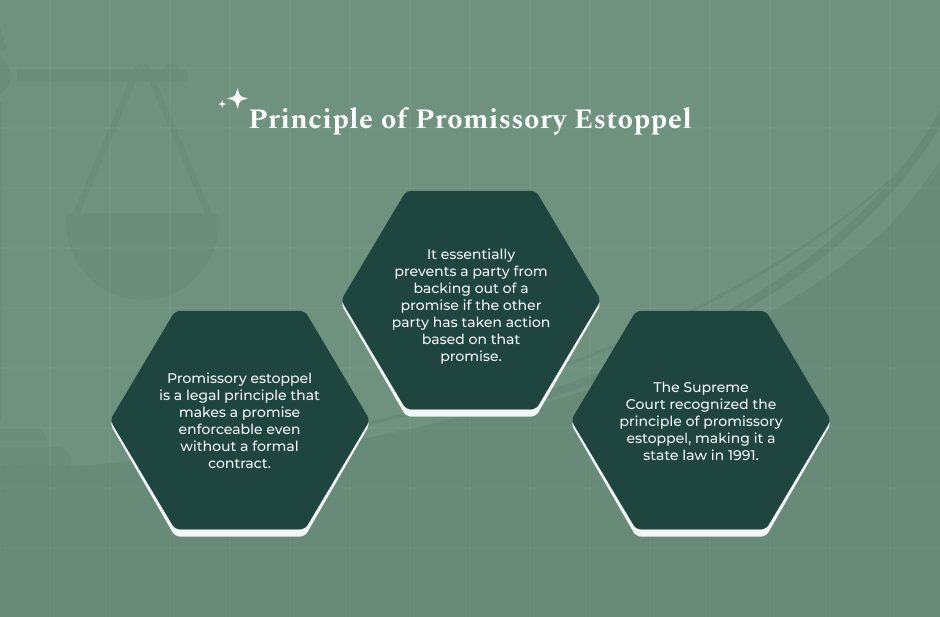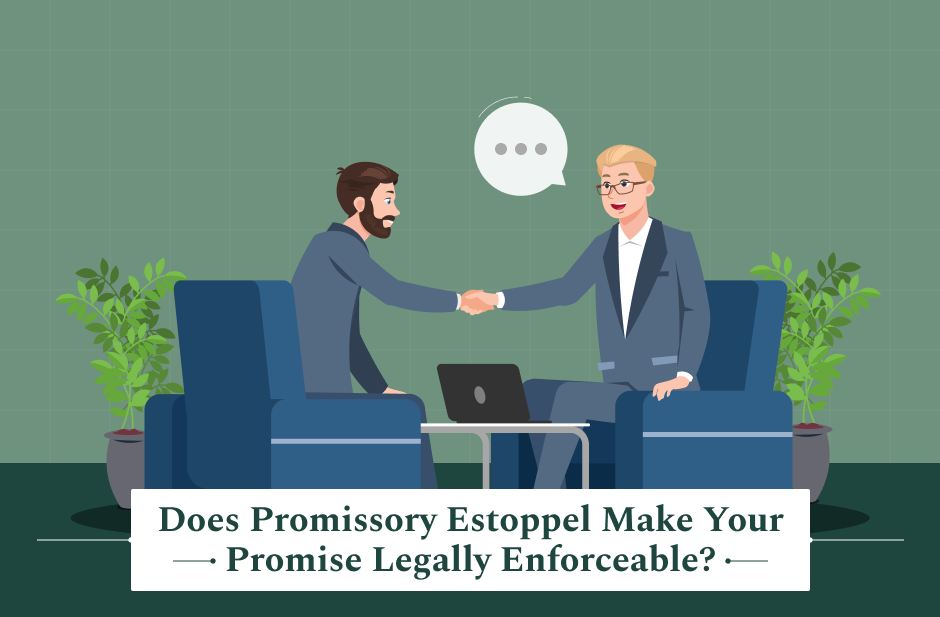Promissory Estoppel is a legal idea that helps protect people when someone makes a serious promise and then changes their mind.
This rule is important because sometimes, even if there’s no written contract, the law may still step in to make things fair.
Especially when one person relies on the promise of another and ends up losing something because of it.
Think of it this way—if you make a big decision because someone promised you something, and then they don’t keep their word, that can hurt.
Promissory estoppel makes sure people don’t break important promises when others are counting on them.
In this article, I will try my best to make you understand what this principle means. And most importantly, can you go to jail if, by chance, you break this promise?
So, if this is something that you want to know, then you have come to the right place…
What is Promissory Estoppel?

Promissory estoppel is a principle. If I really have to explain it, I would say it like this:
“You should not infringe on your promise if someone else has already relied on it and made a major decision because of it.”
This is different from the contract because in the latter, both parties sign a paper.
However, if a person gives a promise and you rely on it, and then if you get hurt because they didn’t keep their word, the law may be able to assist you.
Consider that a person promises to help you pay for your studies. You trust them, so you do not make an application for any scholarships. Suddenly, they withdrew their decision.
If it results in harm to you, the law might tell you, “Listen, you can’t just ignore your promise like that.”
That is exactly how the promissory estoppel works. With the help of this, anyone who has relied in good faith on a promise is protected.
What are the Key Elements of Promissory Estoppel?
For promissory estoppel to work, you need a few key things to happen. Here’s what the court usually looks for:
- A Clear Promise Was Made: Someone must have made a clear and definite promise. It can’t just be a casual comment like, “Maybe I’ll help you.”
- The Other Person Relied on That Promise: The person who heard the promise must have believed it and made decisions based on it. This is what you can call reliance.
- That Reliance Caused Harm or Loss: Because they believed the promise, the person did something—like spending money or passing on another opportunity—and it ended up hurting them when the promise was broken.
- It Would Be Unfair Not to Enforce the Promise: The court asks, “Is it really unfair if we let the person break the promise?” If yes, then promissory estoppel may apply.
These steps help the court decide if it should treat the promise (that the other party has broken) as if it were still a real legal deal. Yes, even if no one had signed a formal contract.
What is an Example of Promissory Estoppel?
Let’s imagine this: Shanaya’s uncle tells her, “I’ll give you $10,000 to help pay for your art school tuition.” She trusts him and decides not to take out a student loan. She registers for classes, pays some of her savings, and waits for her uncle’s money.
But then, her uncle changes his mind and says he won’t give her the money. Shanaya is in trouble—she made a big decision based on his promise.
In this case, Shanaya might use promissory estoppel in court. She can say, “I made a serious decision because I believed my uncle. I lost something because of it. That’s not fair.”
The court could agree and say her uncle needs to keep his promise, even if there’s no written agreement.
So, as you can see, this is exactly how promissory estoppel works! It protects people from getting hurt when they rely on a promise that (they thought) the other party made in good faith.
Is Promissory Estoppel the Same as Detrimental Reliance?
These two terms are closely related—but let’s make it super simple.
- Promissory Estoppel is the legal rule.
- Detrimental Reliance is what happens when someone counts on a promise and gets hurt because of it.
So, you can say that detrimental reliance is part of the story. It’s one of the main ingredients that you need to prove promissory estoppel.
Here’s an easy way to think about it:
Promissory estoppel is like the cake. Detrimental reliance is one of the eggs you need to make the cake.
You can’t have promissory estoppel without showing that someone relied on the promise and suffered a loss. So while they aren’t exactly the same, they go hand in hand.
Your Legal Guide: What are the Consequences of Violating the Promissory Estoppel?
If someone breaks a promise that falls under promissory estoppel, there can be real legal consequences. The court can step in and say, “You made a promise. You can’t take it back now.”
The court might order the person who broke the promise to:
- Pay money to cover the losses the other person faced.
- Do what they promised, if it’s still possible.
- Fix the unfair situation, in whatever way the court thinks is best.
Not keeping your word in a case covered by promissory estoppel is not just a matter of affecting somebody’s feelings.
Rather, it can cause a lawsuit, legal costs, and a dent in one’s reputation. Thus, one should be aware of the promises they are making, especially if the decision maker is other people.
In other words, promises can be effective, even when you have not documented them.
In addition, the legal system can get involved if a person’s trust was cut off, and they lost an item due to the non-implementation of the promise.
You can reach out to a legal professional if one of the parties is you, who had trusted the word of the other and thus suffered.
Take your time to speak with a professional who can provide you with expert advice and tell you which move is rightfully yours.
Read Also:
















